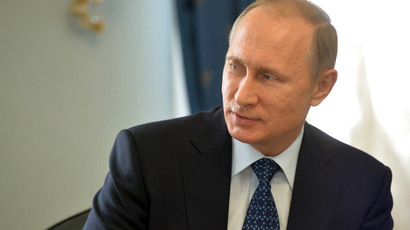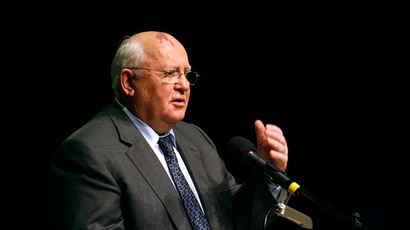Army sources told the paper that the exercise, which will simulate an Iraq invasion for the first time in over a decade, is not a prelude to sending ground troops to fight Islamic State (IS, formerly ISIS, ISIL), rather Exercise Shamal Storm could be seen as a practice routine to fight off any potential Russian invasion of Ukraine or Eastern Europe.
“This isn’t a counter-Isil exercise. If anything, this is much more about us being prepared to join the US in Ukraine than it is in Syria,” a source said as cited by the Daily Telegraph, adding, “This is not the sort of kind of force you expect to roll into Aleppo to take on a bunch of jihadists.”
The aim of the exercise is to show, despite defense cuts, that the British Army would still be able to deploy a 30,000-strong force, which would include troops and military hardware, to any potential global hotspot.
In January, around 80 military vehicles were sent from the UK, bound for the Jordanian port of Aqaba. More than 300 will be used in total. The exercise will be held in the southwestern desert area of the country, while troops from three UK divisions will be taking part.
The operation will look to simulate “theater entry tactics,” while also setting up a field hospital and dealing with chemical and biological weapons. It will be the biggest operation since 2001, when the British Army held a large-scale drill in 2001 called Saif Sereea in Oman.
A spokesman for the British Army told the Daily Telegraph: “The exercise will test key evolving concepts such as the air deployment of a very high readiness field hospital and the latest explosives ordnance disposal and search capabilities, all of which will enable us to be more agile in deterring threats to the UK and its interests.”
The Russian government has on numerous occasions accused the West of scaremongering. In July, President Vladimir Putin told the Italian newspaper Corriere della Sera that a potential Russian attack on NATO would be “insane,” adding that the alliance’s defense budget is 10 times that of Moscow’s.
“I think that only an insane person and only in a dream can imagine that Russia would suddenly attack NATO. I think some countries are simply taking advantage of people’s fears with regard to Russia. They just want to play the role of front-line countries that should receive some supplementary military, economic, financial or some other aid,” Putin said.
Putin stated that hypothetically the US may be looking to maintain a hypothetical external threat in order to maintain its leadership of the NATO community.
On February 2, the Pentagon announced it wanted to quadruple its budget for Europe from $789 million to $3.4 billion in 2017, in order to deter “Russian aggression.”
The budget boost is expected to allow more US forces to be stationed in Europe and for them to take part in more training and exercise routines with local troops in Central and Eastern Europe.
“While we do not desire conflict of any kind with any of these nations – and let me be clear, though they pose some similar defense challenges they are very different nations and situations – we also cannot blind ourselves to the actions they appear to choose to pursue,” US Secretary of Defense Ashton Carter said.
NATO has significantly increased its military presence along Russia’s borders, including in the Baltic States and Eastern Europe, since Russia’s reunification with Crimea in 2014 and the outbreak of conflict in eastern Ukraine. The alliance accuses Moscow of providing support to Ukrainian rebels, who rejected the armed coup in Kiev.
In late August and September 2015, NATO conducted the biggest airborne drills in Europe since the end of the Cold War. About 5,000 soldiers from 11 NATO member states participated in the “simultaneous multinational airborne operations.”
Russia’s national security chief Nikolay Patrushev accused Washington of trying to weaken Russia and did not exclude the US of wanting to break up the country.
“The US leadership has set an objective – to dominate the world. Therefore they don’t need a strong Russia. On the contrary, they want to weaken our country as much as possible,” the head of Russia’s Security Council said in January.
He also added that NATO’s expansion towards Russia’s borders poses a threat to Moscow’s national security.
“To understand NATO’s objectives, one needs to realize that NATO’s leadership strictly sticks to the US agenda. Washington skillfully uses the anti-Russian stance of its eastern members to neutralize ‘excessively independent’ members of the alliance (France, Germany and Italy).”
Source Article from https://www.rt.com/news/331695-uk-war-games-war-russia/?utm_source=rss&utm_medium=rss&utm_campaign=RSS
Related posts:
Views: 0
 RSS Feed
RSS Feed

















 February 8th, 2016
February 8th, 2016  Awake Goy
Awake Goy 

 Posted in
Posted in  Tags:
Tags: 
















